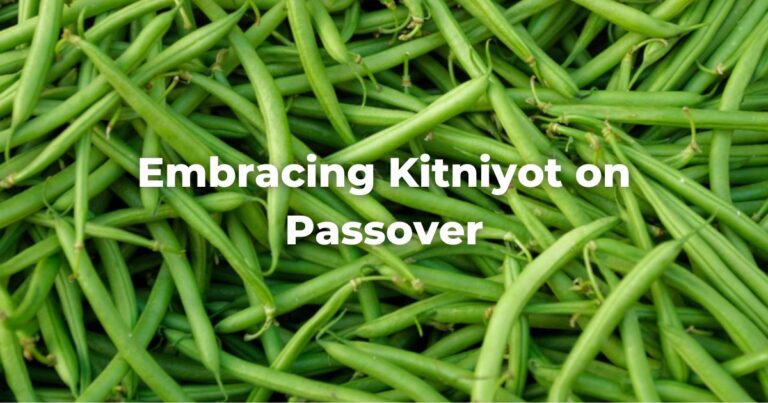This piece is part of Exploring Judaism’s 5784 Passover Reader. Download the whole reader here.
A Hasidic Teaching for Pesach
Rabbi Avraham Yehoshua Heschel (1748-1825) was also known as the Oheiv Yisrael, “The Lover of the people of Israel.” (He was the great, great grandfather of Rabbi Abraham Heschel.) Stories abound of his gentleness, deep love, and compassion for all his fellow Jews. This is one of them, as retold by Rabbi Moshe Shlomo Friedman, the Rebbe (grand rabbi) of the Boyaner Hasidic dynasty in New York.
Rabbi Pinchas of Koretz was extremely strict about the laws concerning the removal of hametz, leavened food, on Pesach. The Oheiv Yisrael was less strict. One Pesach, one of Pinchas’ grandsons came to visit the Oheiv Yisrael’s family. Because he observed his grandfather’s stringencies so scrupulously and zealously, he got into a great deal of angry conflict with his host’s family during the holiday. The Oheiv Yisrael finally took the young man aside and said to him, “You should know that anger is a form of hametz which is forbidden all year round.”
Should our anger be a form of hametz forbidden year-round?
Rabbi Heschel’s response to his Pesach guest feels simplistic and dogmatic. Should our anger be a form of hametz forbidden year-round? If everything is from God, including our emotions, how could expressing anger be forbidden to us?
We know well (as, I suspect, did the Oheiv Yisrael) that not all expressions of anger are the same. Further, never expressing anger to achieve a state of perpetual equanimity (a spiritual goal of early Hasidism) often risks allowing our anger to build until it explodes.
I think the Oheiv Yisrael wasn’t forbidding anger outright, but the anger that results from pride and self-righteousness. Let’s look a bit more closely at our story.
The Oheiv Yisrael playfully but roundly criticized the young man by alluding to a halachic (legal) rule that he would certainly have known: Hametz which remains in a Jew’s possession during Pesach is forbidden during the rest of the year.
The biblical prohibition against even owning (let alone eating) hametz on Pesach is so strict that the Talmudic sages forbade the use of this kind of hametz for all time. The rabbi was also hinting at a common trope in Rabbinic and later Hasidic literature.
It compares the overly fastidious, arrogant, and angry sides of our personalities—the parts of us that are “puffed up with pride”—to leavened, risen bread. On Pesach, we try to free ourselves from the “spiritual Egypt” of our anger and arrogance, to achieve the humility-that-shuns-harshness symbolized by the lowly, unleavened matzah.
Our teacher was telling his young guest: “Your fastidious religious piety isn’t pious; it isn’t even religious. You’re busy being so holy and angrily judging everyone in my family about hametz. Can’t you see what the hametz of your anger is doing to you and to the rest of us? You think you’re celebrating Pesach? Nonsense! You’re stuck in Egypt, now and year-round.”
Anger is a tricky emotion.
Used to convey our distress with others, in the hope of resolution and reconciliation, it is an effective tool for getting our needs met and building our relationships. Used to overwhelm, distress or abuse others, it is an effective tool for corroding relationships and destroying ourselves. Our goal should be expressing anger properly and in moderation.
In fact, long before Rabbi Heschel lived, our teacher Maimonides taught that, “A person should not be wrathful, easily angered, nor be like the dead, without feeling; rather he should [adopt] an intermediate course, i.e., he should display anger only when the matter is serious enough to warrant it, in order to prevent the matter from recurring” (Mishneh TorahRefers to the first five books of the Hebrew Bible, the Tanakh, also called the Five Books of Moses, Pentateuch or the Hebrew equivalent, Humash. This is also called the Written Torah. The term may also refer to teachings that expound on Jewish tradition. Read more, Laws of Human Dispositions 1:4).
With its myriad rules for ridding ourselves of hametz, Pesach can be a time of stress that leads to unnecessary anger. With its myriad problems—especially during this very tragic year of 5784—life can inflict stress on us that makes us respond with destructive anger. Rabbi Heschel’s advice to us this coming Pesach is sound: Anger from a place of love is not the problem. Anger from a place of “spiritual hametz” is what we need to always avoid.
A very happy, kosher, and loving Pesach to us all!
Author
-

Dan Ornstein is the rabbi of Congregation Ohav Shalom, a writer and a teacher living with his family in Albany, New York. He is the author of Cain v Abel: A Jewish Courtroom Drama (Jewish Publication Society, 2020). Check out his website at www.danornstein.com
View all posts






